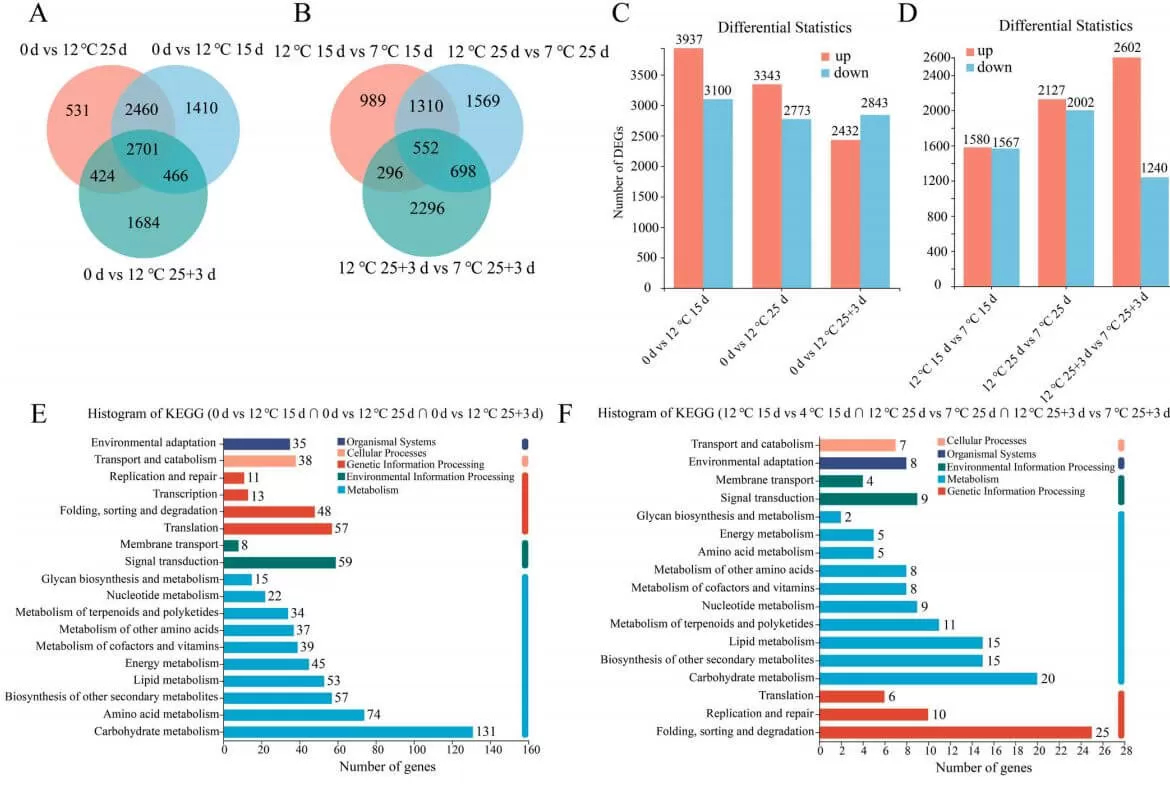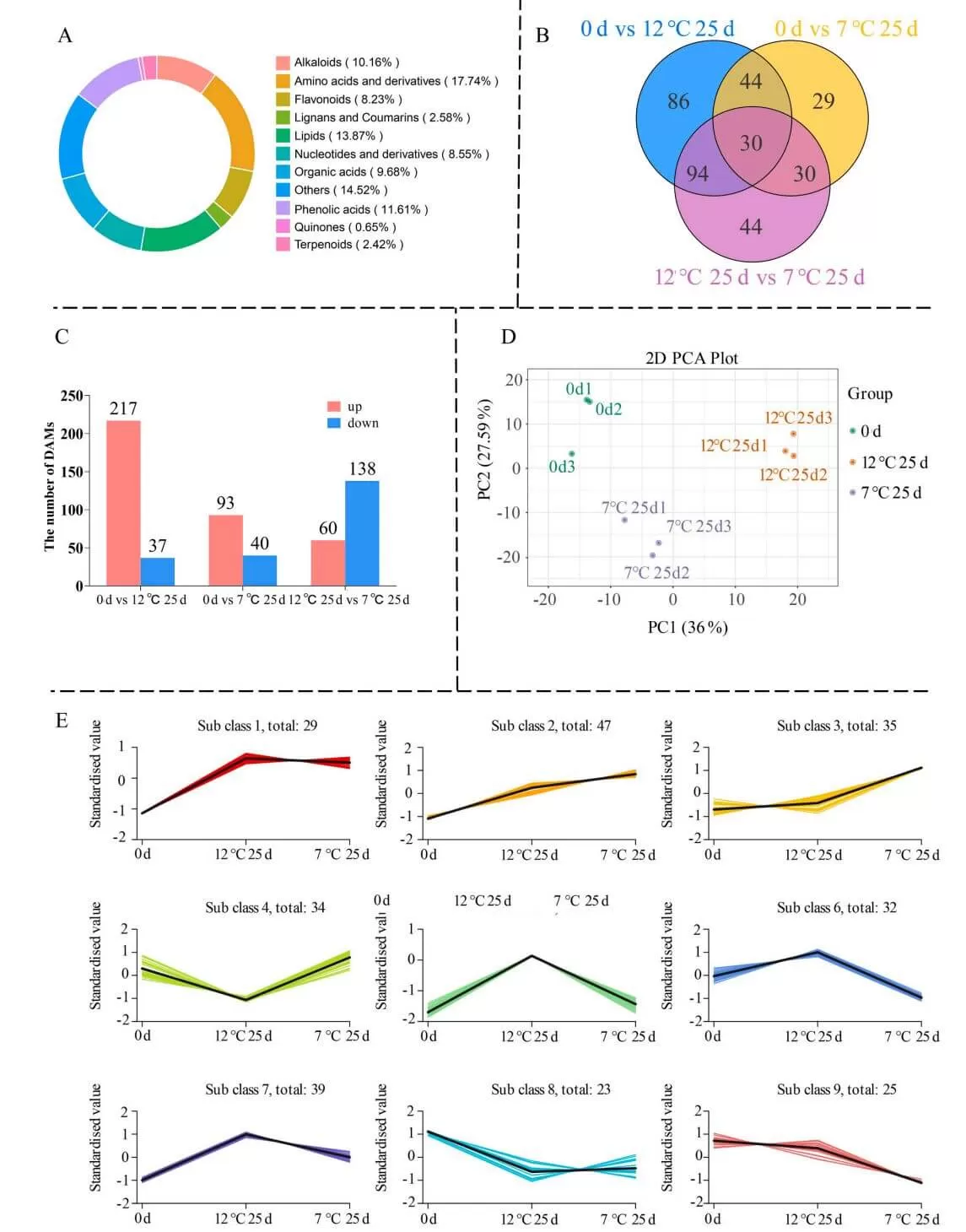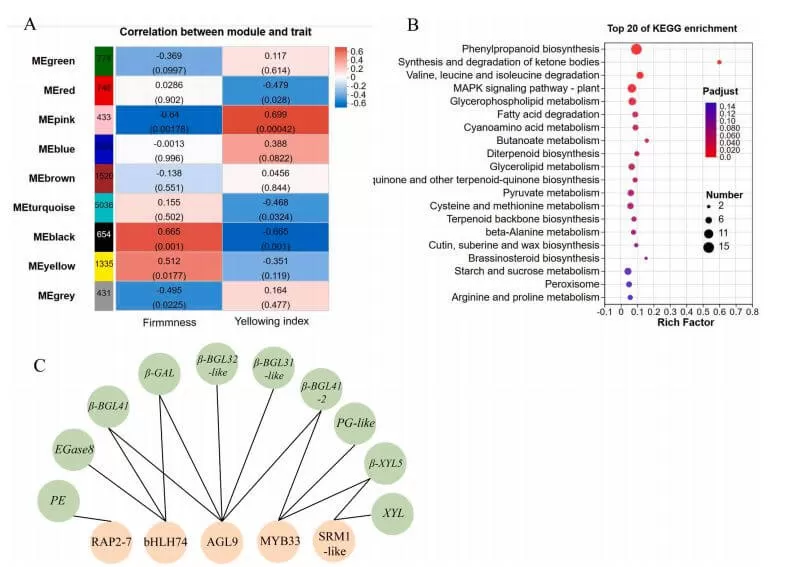How Low-Temperature Stress Impacts Papaya Softening: Transcriptomic and Metabolomic Insights
We are pleased to share an abiotic stress study published in the journal Postharvest Biology and Technology, with the title 'Transcriptomic and metabolomic analyses reveal key factors regulating chilling stress-induced softening disorder in papaya fruit (article resource)'. The article uses transcriptomic and metabolomic techniques to identify key factors in papaya fruit maturation and low temperature stress-induced softening disorder."
1. Transcriptomic differences between papaya fruit stored at 12 ℃ and 7 ℃
Low temperatures induced severe CI in papaya fruit, causing softening disorder. Researchers conducted transcriptome analysis on papaya fruits stored at 12°C and 7°C for 15 days, 25 days, and 25 + 3 days.A total of 7710 DEGs were detected。The number of DEGs between the 0 day and different days of storage decreased gradually during the storage under 12 ℃ . However, the number of DEGs identified between fruit under 7 ℃ and 12 ℃ storage increased from 15 d to 25 d, and 25 + 3 d, indicating that chilling stress greatly altered the transcription profiles of fruit . KEGG analysis showed that the DEGs under 12 ℃ at 15 d, 25 d, and 25 + 3 d compared with 0 d mostly enriched carbohydrate metabolism, amino acid metabolism, biosynthesis of secondary metabolites, signal transduction, and translation pathways .

2. Metabolomic Shifts After Cold Storage in Papaya
A total of 11 types of metabolites were identified, including amino acids, lipids, and phenolic acids, with some being the most abundant.The study identified 357 differentially accumulated metabolites (DAMs), with 254 found after 25 days at 12°C and fewer at 7°C, totaling 133.Principal component analysis (PCA) showed clear separation of metabolites under different storage conditions, with reliable replicates.DAMs were categorized into nine clusters based on their accumulation patterns; some clusters showed increased accumulation with decreasing temperature, potentially related to ripening disorders.KEGG analysis revealed enrichment of specific metabolic pathways during 12°C storage, while 7°C storage altered the enrichment of these pathways.DAMs between 12°C and 7°C storage enriched different metabolic pathways, which may be associated with the softening disorder of papaya fruits under low temperatures.

3. Effects of Low-Temperature Storage on Lignin, Cellulose, and Pectin in Papaya
Transcriptome and metabolite analyses indicate that the low-temperature stress at 7°C induced the expression of genes related to lignin, cellulose, and pectin synthesis, while suppressing the expression of metabolism-related genes. To further confirm the results, the content of cellulose, lignin, and pectin was analyzed. During the storage process at 12°C and 7°C, the total pectin content remained stable, but after treatment with ethylene at 12°C, the pectin content gradually decreased. However, at the end of the ripening period, the total pectin content in the 7°C group was higher than that in the 12°C group. The results suggest that storage at 7°C inhibits the degradation of lignin, cellulose, and total pectin in papaya flesh.

4. Key Genes Involved in Cold-Induced Softening Disorder in Papaya
To identify key genes for papaya softening under cold storage, a WGCNA analysis was performed on 13,183 genes, revealing nine gene expression modules. The MEpink and MEblack modules were most correlated with firmness and yellowing index.Using the JASPAR database,differentially expressed transcription factors from these modules were identified, including RAP2-7, bHLH74, AGL9, MYB33, and SRM1-like 5, which are related to cell wall degradation and metabolism.RT-qPCR analysis of these transcription factors and candidate target genes showed that their expression was positively correlated with fruit ripening. The RT-qPCR results confirmed the transcriptome sequencing findings.

Conclusion
After storage for 25 days at 7°C, the fruit exhibited severe chilling injury (CI) during ripening, with no softening or yellowing. Under low-temperature conditions, the degradation of lignin and cellulose is inhibited, leading to a softening disorder. Integrated analysis of transcriptomics and metabolomics data indicated that CI primarily affects the phenylpropanoid synthesis and the synthesis and degradation pathways of cellulose and pectin in papaya fruit, hindering normal cell wall metabolism and causing the softening disorder. The study also identified key transcription factors (TFs) that regulate these pathways. These findings will aid in exploring new technologies for the storage and transportation of papaya fruit.
Next-Generation Omics Solutions:
Proteomics & Metabolomics
Ready to get started? Submit your inquiry or contact us at support-global@metwarebio.com.


